Related Research Articles

Werner Herzog is a German filmmaker, actor, opera director, and author. Regarded as a pioneer of New German Cinema, his films often feature ambitious protagonists with impossible dreams, people with unusual talents in obscure fields, or individuals in conflict with nature. His style involves avoiding storyboards, emphasizing improvisation, and placing his cast and crew into real situations mirroring those in the film they are working on.

The Enigma of Kaspar Hauser is a 1974 West German drama film written and directed by Werner Herzog and starring Bruno S. and Walter Ladengast. The film closely follows the real story of foundling Kaspar Hauser, using the text of actual letters found with Hauser.

Klaus Kinski was a German actor. Equally renowned for his intense performance style and notorious for his volatile personality, he appeared in over 130 film roles in a career that spanned 40 years, from 1948 to 1988. He is best known for starring in five films directed by Werner Herzog from 1972 to 1987, who would later chronicle their tumultuous relationship in the documentary My Best Fiend.
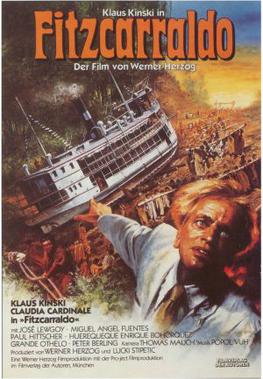
Fitzcarraldo is a 1982 West German epic adventure-drama film written, produced, and directed by Werner Herzog, and starring Klaus Kinski as would-be rubber baron Brian Sweeney Fitzgerald, an Irishman known in Peru as Fitzcarraldo, who is determined to transport a steamship over the Andes mountains to access a rich rubber territory in the Amazon basin. The character was inspired by Peruvian rubber baron Carlos Fitzcarrald, who once transported a disassembled steamboat over the Isthmus of Fitzcarrald.

Walter Kempowski was a German writer. Kempowski was known for his series of novels called German Chronicle and the monumental Echolot ("Sonar"), a collage of autobiographical reports, letters and other documents by contemporary witnesses of the Second World War.
Popol Vuh were a German musical collective founded by keyboardist Florian Fricke in 1969 together with Frank Fiedler, Holger Trülzsch (percussion), and Bettina Fricke. Other important members during the next two decades included Djong Yun, Renate Knaup, Conny Veit, Daniel Fichelscher, Klaus Wiese, and Robert Eliscu. The band took its name from the Mayan manuscript containing the mythology of highland Guatemala's K'iche' people.

Dinkelsbühl is a historic town in Central Franconia, a region of Germany that is now part of the state of Bavaria, in southern Germany. Dinkelsbühl is a former free imperial city of the Holy Roman Empire. In local government terms, Dinkelsbühl lies near the western edge of the Landkreis of Ansbach, north of Aalen.
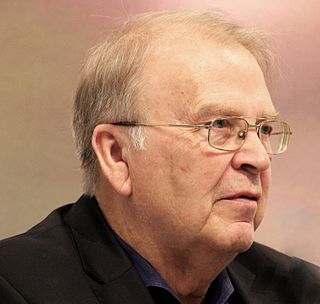
Wilhelm Genazino was a German journalist and author. He worked first as a journalist for the satirical magazine pardon and for Lesezeichen. From the early 1970s, he was a freelance writer who became known by a trilogy of novels, Abschaffel-Trilogie, completed in 1979. It was followed by more novels and two plays. Among his many awards is the prestigious Georg Büchner Prize.

The 28th Cannes Film Festival was held from 9 to 23 May 1975. The Palme d'Or went to the Chronique des Années de Braise by Mohammed Lakhdar-Hamina. In 1975, a new section, "Les Yeux fertiles", which was non-competitive, was introduced. This section, along with sections "L'Air du temps" and "Le Passé composé" of the next two years, were integrated into Un Certain Regard in 1978.
'Beate Mainka-Jellinghaus' is a German film editor who was a member of the New German Cinema movement and is noted particularly for her many films with director Werner Herzog. Between 1966 and 1986, she was credited on more than twenty-five feature films and feature-length documentaries.

"Now thank we all our God" is a popular Christian hymn. Catherine Winkworth translated it from the German "Nun danket alle Gott", written c. 1636 by the Lutheran pastor Martin Rinkart. Its hymn tune, Zahn No. 5142, was published by Johann Crüger in the 1647 edition of his Praxis pietatis melica.
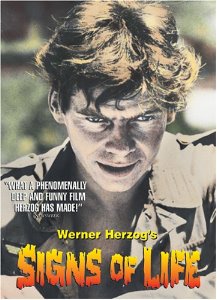
Signs of Life is a 1968 feature film written, directed, and produced by Werner Herzog. It was his first feature film, and his first major commercial and critical success. The story is roughly based on the short story "Der Tolle Invalide auf dem Fort Ratonneau" by Achim von Arnim.

Navid Kermani is a German writer and orientalist. He is the author of several novels as well as books and essays on Islam, the Middle East and Christian-Muslim dialogue. He has won numerous prizes for his literary and academic work, including the Peace Prize of the German Publishers' Association on 18 June 2015.
Werner Spies is a German art historian, journalist and exhibition organizer. From 1997 to 2000, he was a director of the Centre Georges Pompidou in Paris. Klaus Albrecht Schröder, director of the Albertina in Vienna, has called Spies "one of the most influential art historians of the 20th century."
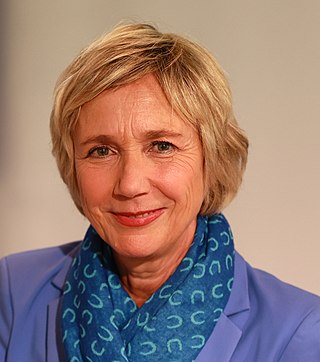
Amelie Fried is a German writer and television presenter. Her father, Kurt Fried, is the creator-publisher of Schwäbische Donauzeitung, nowadays a part of Südwest Presse. She studied journalism and film at university. She has worked extensively in television and has published numerous books. Her 2008 book Schuhhaus Pallas. Wie meine Familie sich gegen die Nazis wehrte deals with her family's persecution in Nazi Germany. The book received significant media attention and has been the subject of much debate.

"Macht hoch die Tür" is a popular German Advent hymn, written in 17th century Ducal Prussia. The lyrics were written by Georg Weissel in 1623 for the inauguration of the Altroßgärter Kirche in Königsberg. The melody that is now associated with the text appeared first in 1704 in the hymnal by Johann Anastasius Freylinghausen.
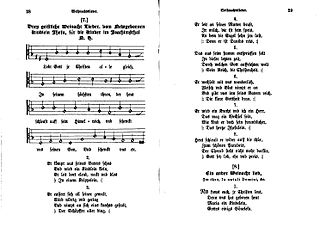
"Lobt Gott, ihr Christen alle gleich" is a German Christmas carol with lyrics and melody by Nikolaus Herman. It is part of Protestant and Catholic hymnals, has inspired musical settings, and has been translated. The title is also known as "Lobt Gott, ihr Christen allzugleich".

Every Man for Himself and God Against All: A Memoir is a 2022 memoir by the German filmmaker Werner Herzog.
Walter Saxer is a Swiss film producer, production manager, screenwriter, and film director, born in 1947 in St. Gallen.
References
- ↑ "Herzog on Herzog". Thestickingplace.com. Retrieved 25 October 2009.